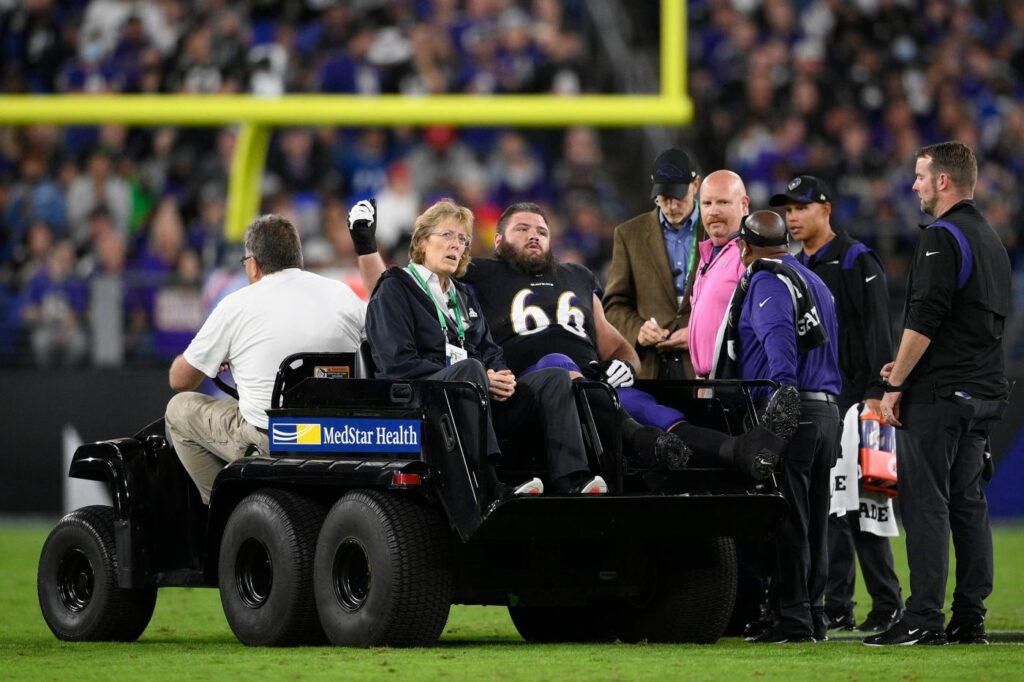
In mid-January, Ravens coach John Harbaugh held a four-hour meeting with his sports performance staff. The team was coming off maybe the most injury-marred year in recent NFL history, sabotaging a season with Super Bowl ambitions. Everything was up for review.
“From practice schedules, from training camp schedules, from [organized team activities], from how we train, from how we condition, even how we do our team, all of our modeling in terms of [practice] loads and things like that in our team periods and in our individual periods,” Harbaugh said at his end-of-season news conference in late January. “I mean, man, we’re going to look at everything, and we’re going to change a lot.”
Change is already underway. At the NFL owners meetings Monday, Harbaugh said the Ravens have altered their approach to offseason workouts and preseason practices. In training camp, for instance, every third practice will be shorter, more “execution oriented,” Harbaugh said, and “less competitive,” with fewer repetitions between the first-team offense and first-team defense.
Harbaugh said keeping the team healthy is “priority one, for sure, along with being really good and making sure we put a good team on the field and we’re prepared.”
“I don’t know if we’ve reached any conclusions about why the injuries happened,” Harbaugh said. “Nobody has those conclusions. We’ve listened. We’ve seen all the studies. We talked to all the NFL people, all the studies they’re doing. And there really are no answers that you can say definitively, ‘This is the cause and effect.’ But we’ve looked at everything we’ve done. Like we said, we turned over every stone. We’ve changed a lot of what we’re doing. …
“We’re going to approach OTAs differently. We’re going to approach training camp, some big-picture schedule differently, in terms of the way we ramp [up] and in terms of the way we time practices, how long we’re on the field, what we’re doing on the field, how we pace the rhythm of the practices — and even within the practices, what we do early and how we pace the rhythm of our practices.”
The Ravens’ injury woes reached absurdist levels on Sept. 9, when cornerback Marcus Peters and running back Gus Edwards suffered season-ending knee injuries within a span of a couple of plays. Team owner Steve Bisciotti, who was watching the practice, recalled Tuesday that the Ravens’ injury cart hadn’t even dropped off Peters before it was called back for Edwards.
Edwards was the third Ravens running back to suffer a season-ending injury in a 12-day span, after J.K. Dobbins tore his ACL in the team’s Aug. 28 preseason finale and Justice Hill tore his Achilles tendon on Sept. 2. The team later lost left tackle Ronnie Stanley, cornerback Marlon Humphrey and quarterback Lamar Jackson, among others, to season-ending injuries. Key contributors like rookie wide receiver Rashod Bateman, tight end Nick Boyle and offensive lineman Tyre Phillips missed significant time as well.
Because of injuries and the coronavirus, 75 Ravens were active for a game last season, tying a franchise record. According to the analytics website Football Outsiders, the Ravens last season had 191.2 “adjusted games lost” because of injuries, a metric that accounts for the relative value of starters. No team over the past two decades, even when prorated for a 16-game season, has had more injury-related personnel losses.
“The only benefit of it is, it forces you to tear things down to the base and kind of rebuild them,” Bisciotti said. “It’s like cleaning out your closet. You kind of know you have to do it sooner or later and you hate it, hate it, hate it, until you’re done and you’re like, ‘I feel so good that I finally cleaned out my closet. I can see my clothes again.’ I think it was a good exercise to have to tear it down and look at that. …
“If we change everything that we think we need to change this year and it happens again, then everyone is going to go, ‘They have the worst luck in the world.’ And if we don’t again, then people are going to say, ‘Well, it wasn’t all bad luck. They changed a lot of their practices to get to this point.’ We’ll take that, too. I believe we’re a better organization because we were forced to address it.”
()
